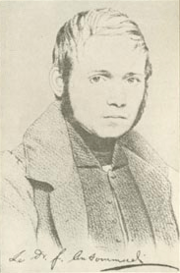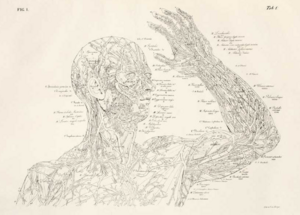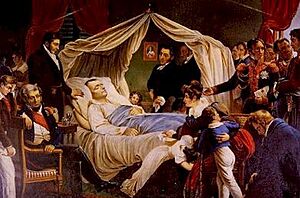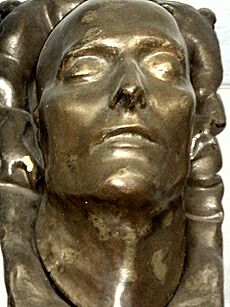François Carlo Antommarchi facts for kids
Quick facts for kids
François Carlo Antommarchi
|
|
|---|---|
 |
|
| Born | 5 July 1780 Morsiglia, Corsica
|
| Died | 3 April 1838 (aged 57) Santiago de Cuba, Cuba
|
| Occupation | Doctor of Medicine/Surgeon |
| Parent(s) | Juan Antommarchi and Bidgetta Matey |
François Carlo Antommarchi (born July 5, 1780, died April 3, 1838) was a French doctor and surgeon. He is best known for being the personal physician to Napoleon I during Napoleon's final years. Napoleon was a famous French military leader and emperor.
Antommarchi served Napoleon from 1819 until Napoleon's death in 1821. After Napoleon's death, Antommarchi wrote a book about his time with the emperor.
Contents
Becoming a Doctor
François Carlo Antommarchi started his studies in Livorno, Italy. He then went to the University of Pisa, where he earned his degree as a Doctor of Philosophy and Medicine in March 1808.
Later, he moved to Florence, Italy. There, he worked at the Hospital of Santa Maria Nuova. In 1812, he earned his diploma as a Surgeon from the University of Florence. He was also appointed as a Prosector, which meant he helped prepare bodies for anatomical study. He worked under a famous anatomist named Paolo Mascagni.
Serving Napoleon
Antommarchi left Florence to go to Saint Helena. This was a remote island where Napoleon was held captive. Napoleon's mother and uncle asked Antommarchi to become Napoleon's personal doctor. He received his job offer on December 19, 1818.
Antommarchi was sent to replace another doctor. Napoleon did not want to accept doctors chosen by his captor, Sir Hudson Lowe.
However, Napoleon was not always happy with Antommarchi's medical skills. He even fired him a few times, but then let him come back to work. During Napoleon's last illness, another doctor, Archibald Arnott, helped Antommarchi.
After Napoleon died, Antommarchi wrote a book called The Last Moments of Napoleon. In this book, he stated that Napoleon died from stomach cancer.
Life After Napoleon
In 1831, Antommarchi traveled to Poland. He became the general inspector of Polish hospitals during the November Uprising. This was a time when Polish people were fighting against Russian rule.
He helped the Polish people during this uprising. To escape the Russian forces, he later fled to Paris, France.
Antommarchi then moved to Louisiana in the United States. In 1834, he gave a special gift to the people of New Orleans: a bronze death mask of Napoleon. A death mask is a copy of a person's face made after they die.
He lived for a short time in Veracruz, Mexico, working as a traveling doctor. Later, he settled in Santiago de Cuba, Cuba. He continued to work as a doctor there. He also taught anatomy and sculpting privately.
Antommarchi moved to Cuba to find his cousin, Antonio Juan Benjamin Antommarchi. His cousin had become wealthy from coffee farms. While in Cuba, Antommarchi became very skilled at performing surgery to remove cataracts, which are eye problems that can cause blurry vision.
He died in Cuba on April 3, 1838, at the age of 57. He passed away from yellow fever, a serious illness spread by mosquitoes.
Life Timeline
| Event | Place | Date |
|---|---|---|
| Birth | Morsiglia, Corsica, France | 5 July 1780 |
| Earned Doctor of Philosophy and Medicine Degree | Pisa, Italy | March 1808 |
| Earned Surgeon Diploma | Florence, Italy | 1812 |
| Became Prosector | Florence, Italy | 7 July 1813 |
| Became Napoleon I's physician | Saint Helena, United Kingdom | 19 December 1818 |
| Arrived in Saint Helena | Saint Helena, United Kingdom | 10 September 1819 |
| Made Napoleon's Death Mask | Saint Helena, United Kingdom | 7 May 1821 |
| Published "Anatomical Prints of the Human Body with Natural Dimensions" | Paris, France | 1823 |
| Published various books based on his diary of Napoleon's medical care | 1823–1826 | |
| Became general inspector of Polish hospitals | Poland | 1831 |
| Moved to Santiago de Cuba, Cuba | Santiago de Cuba, Cuba | 1834 |
| Visited Louisiana | Louisiana, United States | 1834 |
| Visited Veracruz | Veracruz, Mexico | June–July 1837 |
| Death | Santiago de Cuba, Cuba | 3 April 1838 |
Important Works
Napoleon's Death Mask
On May 7, 1821, Antommarchi made a plaster cast of Napoleon's face. This cast is known as Napoleon's death mask. Many copies of this mask have been made.
You can see copies of Napoleon's death mask in several museums and institutions around the world. Some places include the Louisiana State Museum in New Orleans and the Musée de l'Armée in Paris, France.
Diary of Napoleon's Medical Care
Antommarchi kept a detailed diary of the medical care he gave to Napoleon. This diary became an important source for many books. These books were published between 1823 and 1826. They were translated into many languages, including French, English, German, Italian, and Spanish.
Anatomical Prints of the Human Body
Paolo Mascagni was a very famous anatomist during his time. Antommarchi worked for Mascagni as a Prosector. Mascagni had left behind many notes and drawings for a large book about human anatomy.
Antommarchi helped prepare these for publication. However, he was called to Saint Helena before the book was finished. When he returned, he published these drawings. They were printed using a method called lithography.
The huge work was published between 1823 and 1826. It was titled "Anatomical Prints of the Human Body with Natural Dimensions." The drawings for this book were made by Antoine Seratoni.

Name Variations
François Carlo Antommarchi's name can be found in different ways. This is because of translations and sometimes misspellings.
- Francesco Carlo Antommarchi (original Italian name)
- François Charles Antommarchi (French translation)
- Francisco Carlos Antommarchi (Spanish translation)
- Francis Charles Antommarchi (English translation)
- Francesco Carlo Antomarchi (a common misspelling)
The name "François" is pronounced "frahn-swah."
 | Toni Morrison |
 | Barack Obama |
 | Martin Luther King Jr. |
 | Ralph Bunche |



